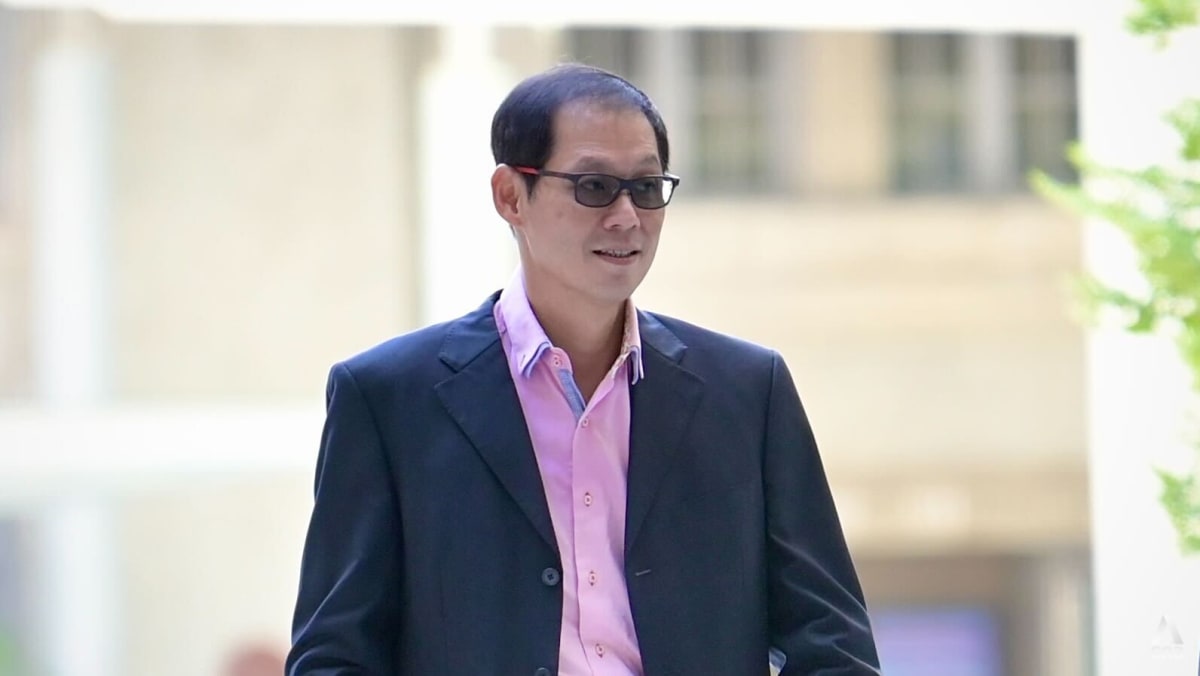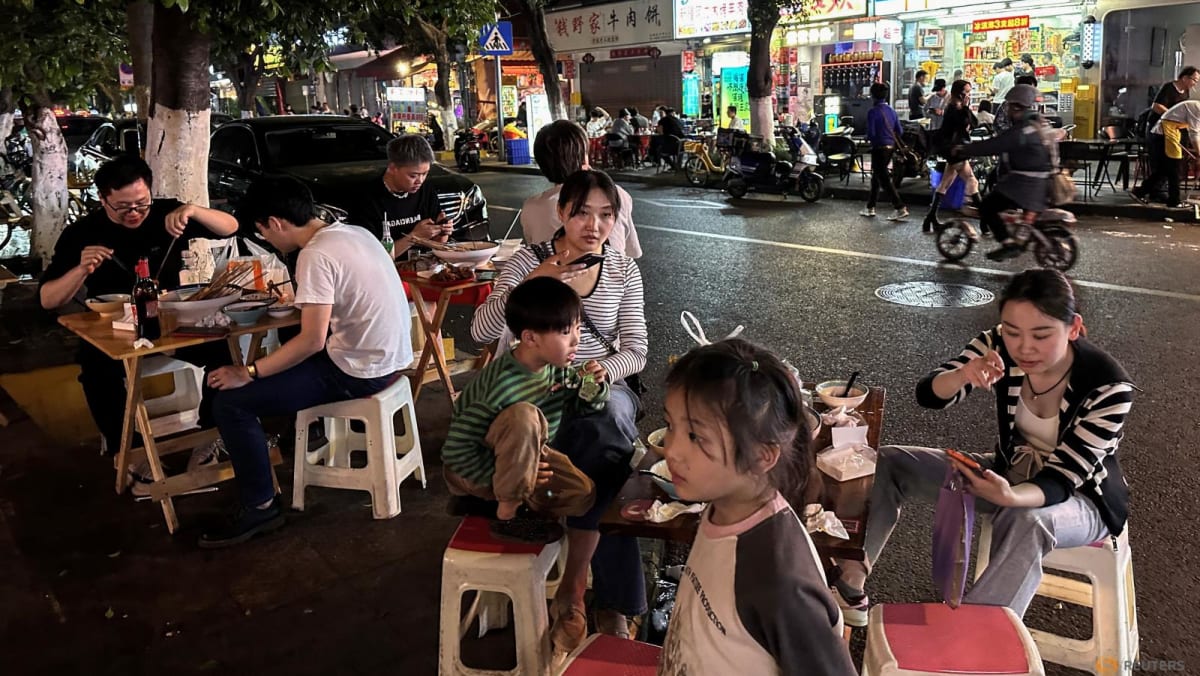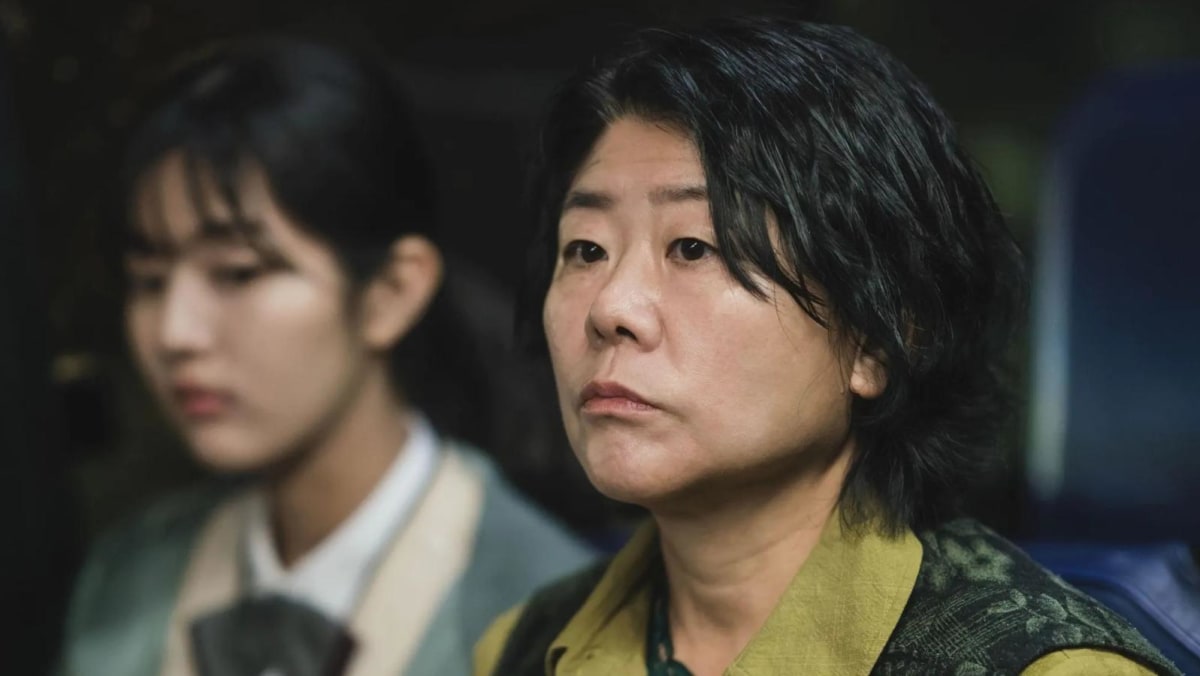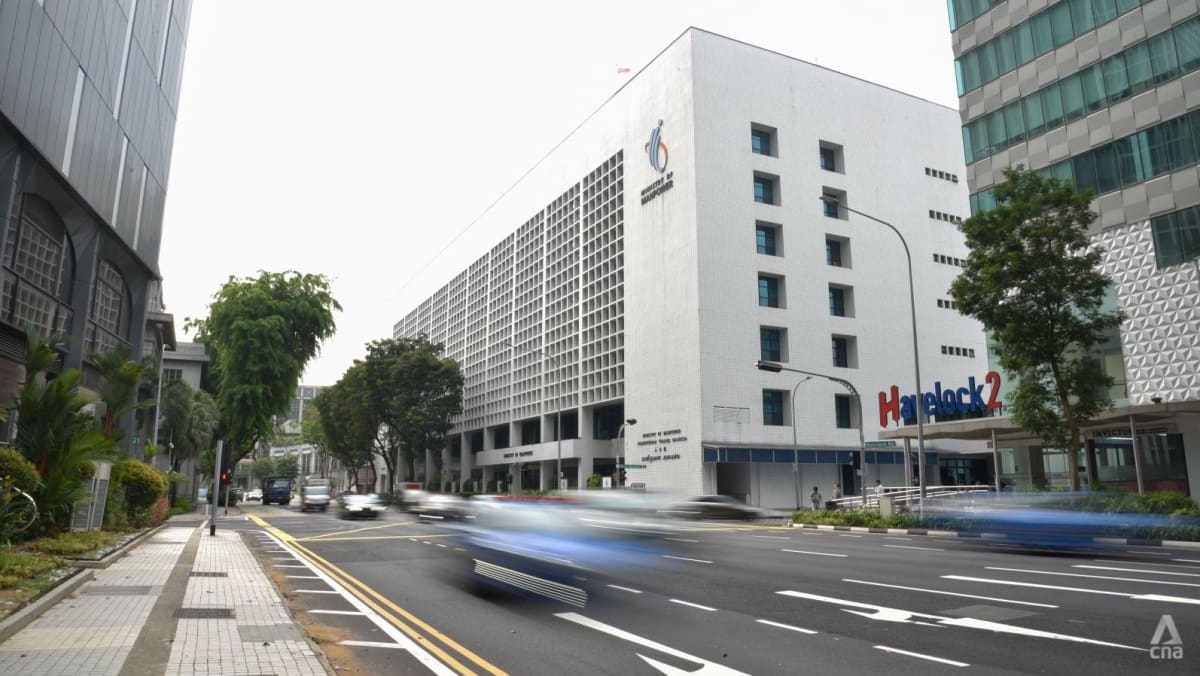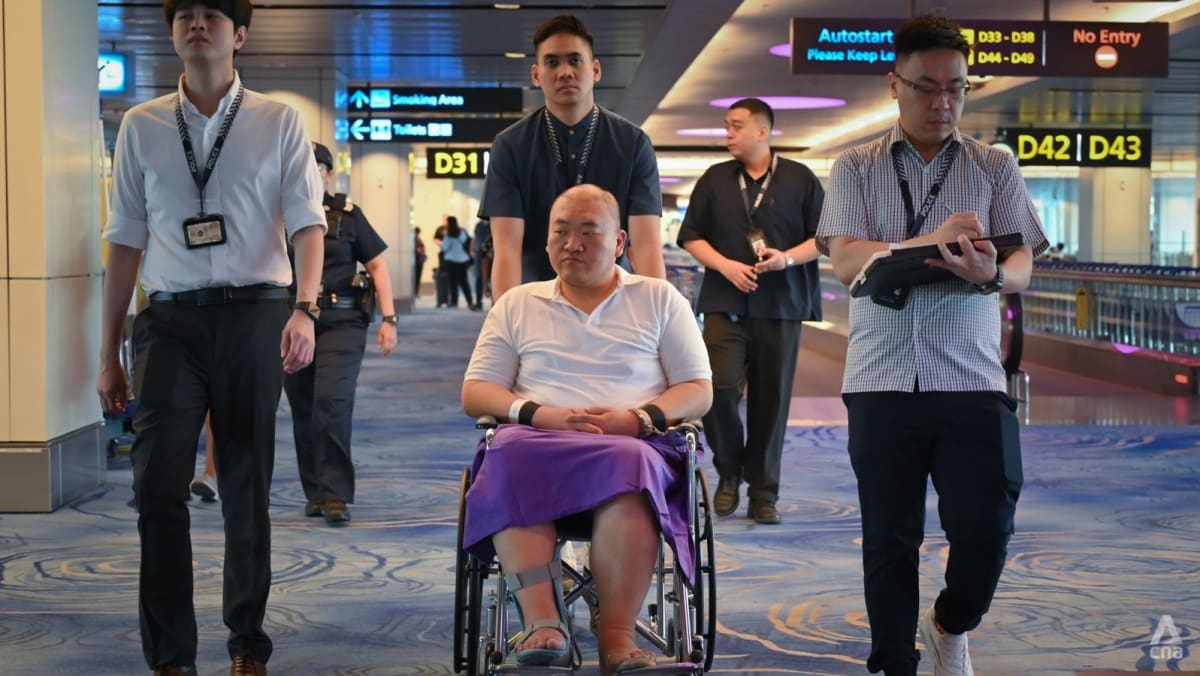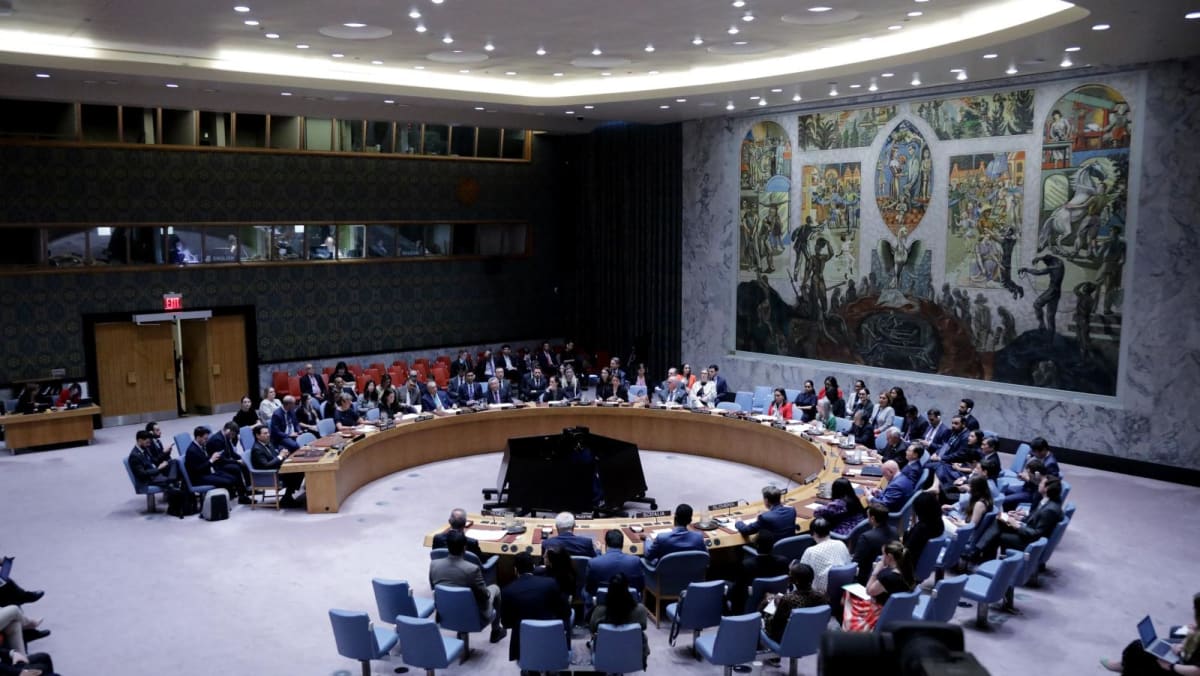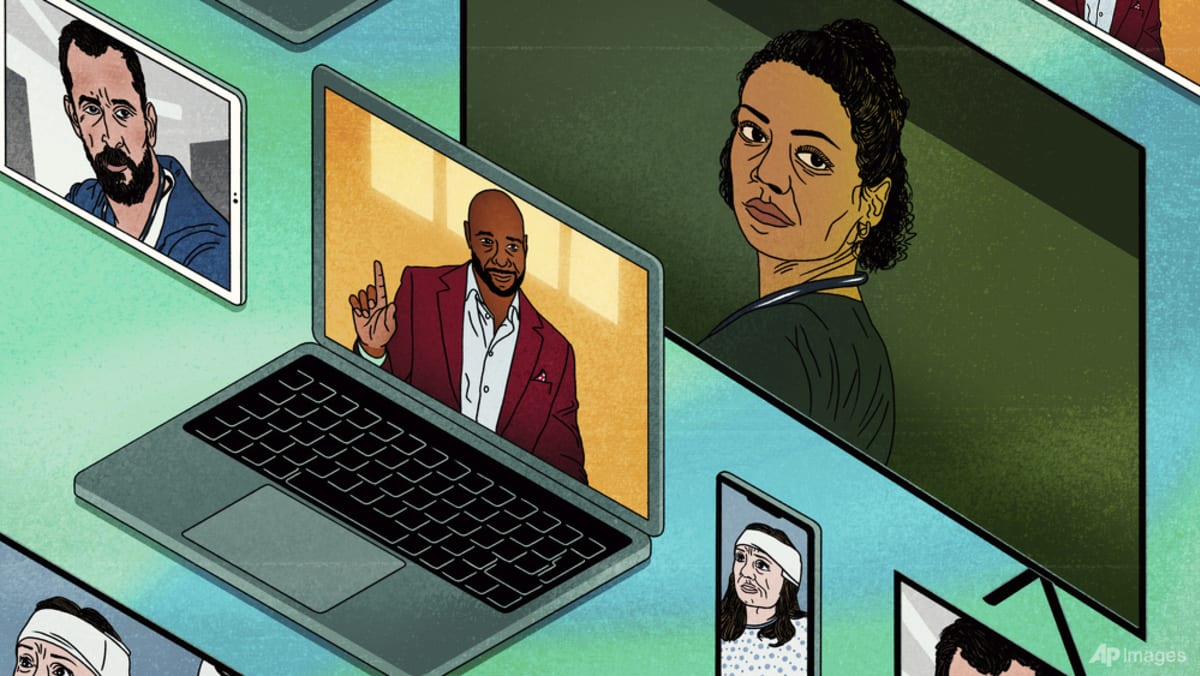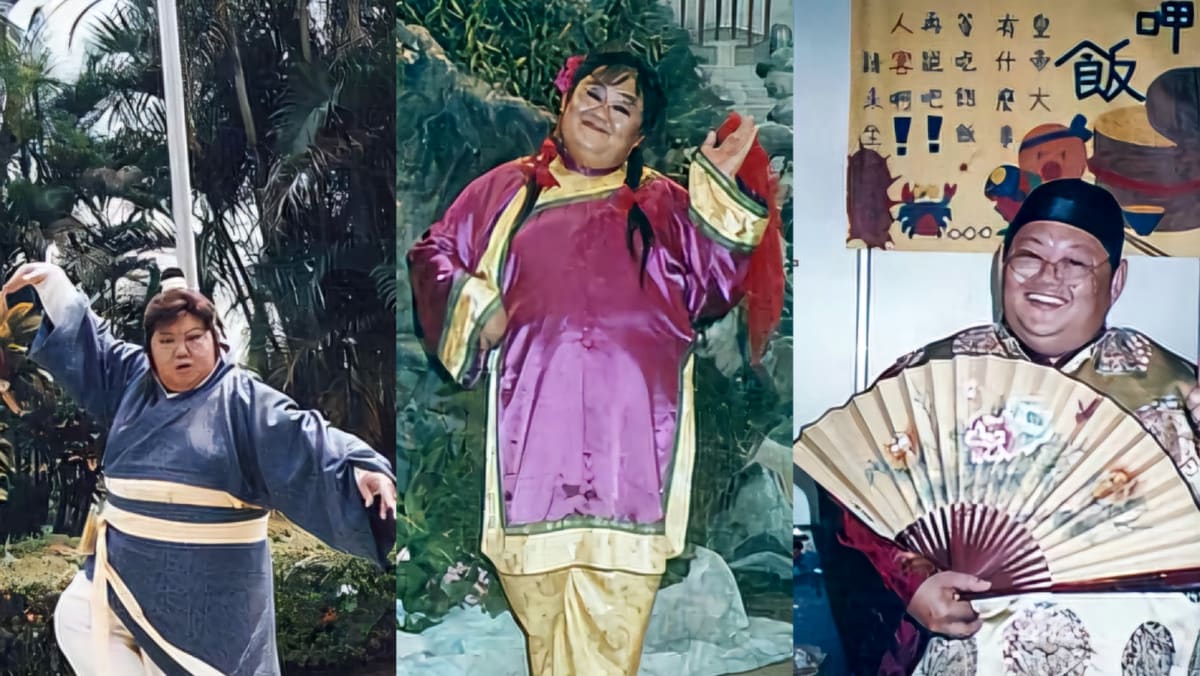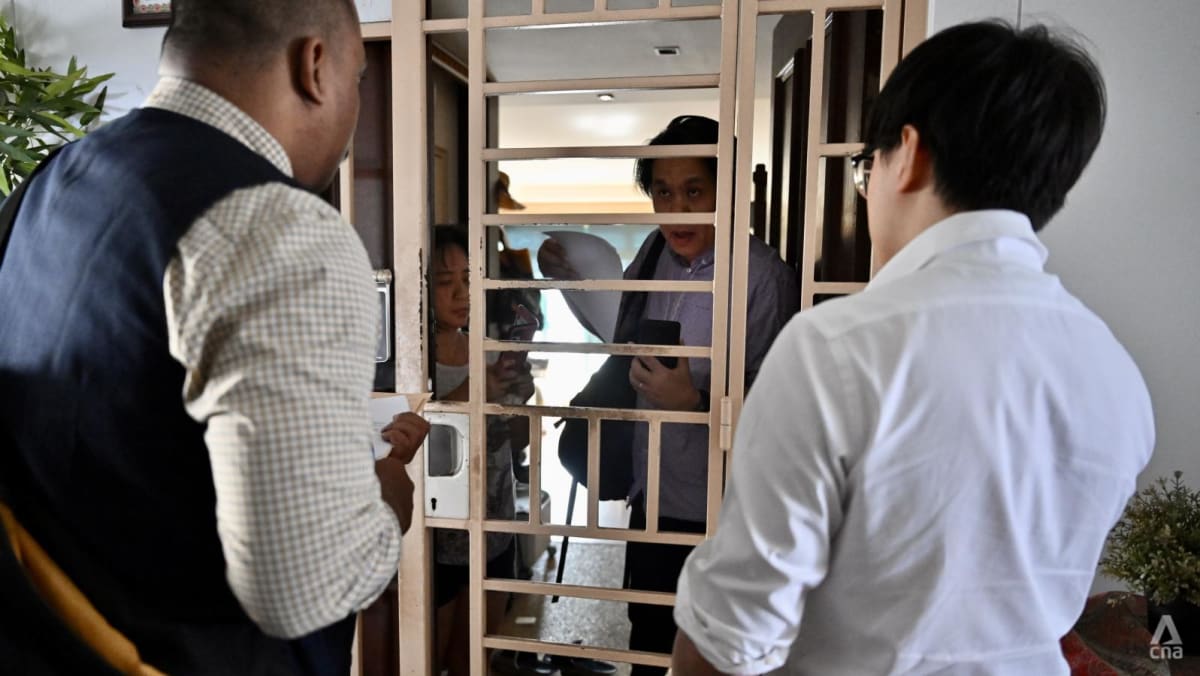At 83 years old, Mr Lee Ah Meng has come to accept a nursing home in Yishun will be where he will spend the rest of his life.
When he was younger, he lived in a one-room rental flat in Geylang Bahru with a friend, after going through a divorce and having lost touch with his siblings.
But as his health deteriorated in 2022, Mr Lee was discharged from a hospital and admitted into a nursing home run by social service agency Sree Narayana Mission.
“I am over 80 years old now. No one has visited me (in years). There’s no one in my family to come see me.
"They don’t know that I came (to a nursing home), and I don’t know my sister or brother's address,” said Mr Lee, who has not spoken to his younger sister and elder brother in over 30 years.
Mr Lee is among a group of elderly individuals in Singapore who arrive at nursing or welfare homes not by choice, but out of necessity, often after they can no longer care for themselves.
Some, like him, have been estranged from their family and friends for years. Others have no children, or have outlived the few family members they had.
When her husband died, Mdm Chan Sow Lin, who does not have children, found herself truly alone for the first time in decades.
At the time, she had been a regular at a day care centre, and staff members soon noticed she was becoming increasingly forgetful and dependent on others for care.
Concerned about her safety and well-being after centre hours, the day care centre referred her to full-time care in a nursing home.
The now 83-year-old widow has resided in the Sree Narayana Mission nursing home facility since 2024 – a place she told CNA TODAY she never imagined herself being.
Her case manager and social worker at the nursing facility Mary Joseph Lourdes said many like Mdm Chan initially struggle to adjust to life inside residential care.
“Most of these residents will be in denial (at first), like ‘How come I ended up being in a nursing home?’” said Ms Lourdes.
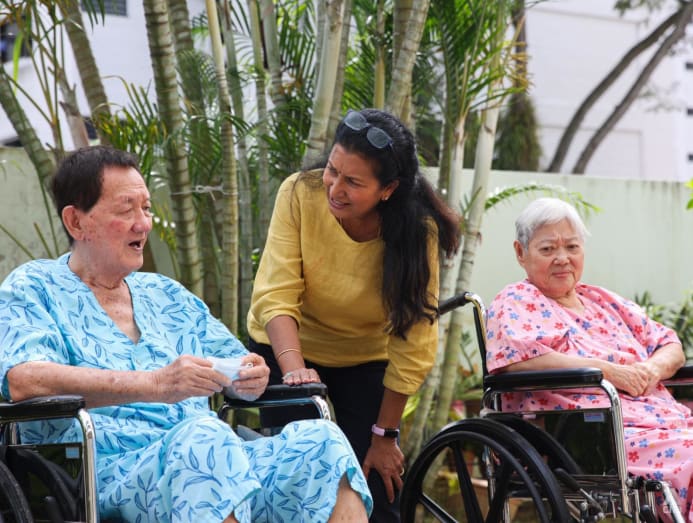 Residents at Sree Narayana Mission nursing home Mr Lee Ah Meng (left), 83, and Mdm Chan Sow Lin, 83, speaking with case manager Ms Lourdes Mary Joseph (centre). (Photo: CNA/Nuria Ling)
Residents at Sree Narayana Mission nursing home Mr Lee Ah Meng (left), 83, and Mdm Chan Sow Lin, 83, speaking with case manager Ms Lourdes Mary Joseph (centre). (Photo: CNA/Nuria Ling)
This is particularly true for those with no next of kin, many of whom have gotten accustomed to living alone till age and illness catch up with them.
There are at least 14 reported cases of appeals for next of kin for individuals who had died in nursing homes and welfare homes in 2024, a search of police news releases by CNA TODAY found.
In 2023, the Ministry of Health said that about 83,000 seniors will live alone by 2030.
While national programmes such as Age Well SG support seniors “ageing-in-place” – encouraging them to grow old in their homes and communities – what happens to those who lack family or friends to lean on?
With the support of grants, donations and volunteers, nursing homes provide long-term medical care for seniors with chronic illnesses or disabilities who need daily assistance.
Then there are the welfare homes overseen by the Ministry of Social and Family Development (MSF), which cater to destitute individuals who are generally more mobile and independent but lack the means or family support to live on their own.
As of February 2025, around 1,500 people reside in these homes, with 60 percent aged 60 and above, MSF told CNA TODAY.
The paths that lead individuals with no next of kin into long-term residential care vary, as do their levels of grief, loneliness and acceptance of their circumstances.
Yet, for many seniors who first came to these elderly care facilities fearing isolation and abandonment, there is a sense of belonging and companionship still to be found in their twilight years.
Speaking to CNA TODAY, they shared how despite initial apprehension about easing into life at these facilities, they eventually grew to appreciate the companionship of staff members, volunteers, as well as fellow residents who also understand the fear of growing old alone.
Residential homes, too, go beyond just providing care and strive to create a lively atmosphere with activities that encourage social interaction and outings that keep residents connected to their past.
“It can’t be helped that I’m staying in a nursing home – I can’t walk,” said Mr Lee in Mandarin.
“But I’ve come here and it’s good. There’s someone to take care of me. I can play mahjong, go outside, and I have friends here.”
RESIDENTIAL CARE IS THE ONLY OPTION FOR SOME
Single elderly Zack (not his real name), 70, has been a resident at MWS Christalite Methodist Home operated by Methodist Welfare Services (MWS) since 2020. Due to the sensitive circumstances of their admission and stay, the welfare home cannot disclose residents' identities.
After a few stints of being incarcerated for drug and theft offences, Mr Zack sought shelter in public places as he did not want to burden his family.
Over the years, he lost contact with his surviving relatives and relied on his limited savings.
“Here, food and basic necessities are all prepared for me. Back then, I had to go around to find (food) myself,” said Mr Zack in Malay.
Mr Zack is one of many elderly individuals living in Singapore’s 11 welfare homes, which are run by social service agencies to provide care for destitute persons.
MSF said an individual may be admitted into a welfare home under the Destitute Persons Act for “social investigation”.
“The social investigation seeks to establish that the individual meets the definition of destitute persons under the Act, that is, an individual who has no visible means of subsistence or place of residence or is unable to give a satisfactory account of himself or herself,” said MSF.
Because of these criteria, many elderly residents in these homes are those without caregivers or next of kin to support them, making long-term residential care their best or only option.
Associate Professor Helen Ko from Singapore University of Social Sciences (SUSS) said that with the rise of dual-income, no-kids households and the "beanpole" family structure, where each generation has fewer children, the number of seniors in such circumstances is sure to rise.
As many come from lower-income families, or are frail and have limited social support, they are also more likely to be reliant on institutional care, said Assoc Prof Ko, who oversees SUSS’ Master’s and PhD Gerontology Programmes.
Speaking to CNA TODAY, 77-year-old Ah Tan, who has been staying at MWS Christalite Methodist Home for 17 years, recounted how he was found rough sleeping in the Tekka area after his brother, whom he was sharing a flat with, had died.
“My brother, my sister… they have all gone. My mother, (they) have all died already, so I’m alone,” Ah Tan, a double amputee, said in a choked tone.
A MWS spokesperson said common circumstances that have led the residents to stay in the welfare home include the lack of finances, long-term prison sentences or admission to the Institute of Mental Health (IMH) that eventually resulted in a loss of accommodation.
Many, like Ah Tan, receive direct counselling and attend social activities during their stay, to manage the “complex psycho-emotional challenges” they face.
“For this group of individuals who are so rarely seen in public, it’s possible that many Singaporeans either do not know of their existence or have misperceptions about them,” said the spokesperson.
Mr Richard Quah, the chief executive officer of St John’s Home for Elderly Persons, said that about eight to 10 percent of their residents have no contact with their families.
“This can arise from various situations, including disagreements, communication breakdowns, life transitions, or differences related to caregiving responsibilities,” he added.
Nursing and welfare homes said many of these individuals lacking family support also come from lower-income backgrounds, previously living alone in one- or two-room rental flats, and face significant health challenges.
Some have experienced past family conflicts, including physical abuse, absentee parenting, or issues related to gambling and money lending, said Ms Tho Pei Leng, a senior medical social worker at NTUC Health.
As for who foots the bill for these seniors with no next of kin, Ms Bridget Monica Das, head of psychosocial services at Ren Ci Hospital, said some seniors may lack family connections but are able to pay their own bills.
For seniors without the financial ability, however, the nursing home taps on government subsidies, MediFund and money from charities.
ADJUSTING TO LIFE IN A NURSING HOME
At MWS Christalite Methodist Home, residents' days begin at 6am with a shower and breakfast, before they receive medical treatment and participate in morning exercise.
“The rest of the day’s programme comprises different activities that are aimed at maintaining the residents’ overall well-being. These include adaptive sports, cognitive games, recreational games, and physio or occupational therapy sessions,” said the MWS spokesperson.
The welfare home provides all residents with three main meals, two tea breaks, and hosts recreational activities such as a monthly movie night.
But while the essentials are provided for, for some elderly residents with no familial connections to speak of, the fear of loneliness is a primary concern when adjusting to their new life.
Ms Lourdes said that around 30 residents at the nursing home run by Sree Narayana Mission have no contact with their next of kin. Presently, the 224-bedded nursing home facility is operating close to full capacity.
“One of the main things the residents with no next of kin speak about is grief. Before they entered the nursing home, they may have had some connections, but now no one visits them, so that’s a great loss,” said Ms Lourdes.
While these residents may receive visits now and then from volunteers, the inevitable comparison with other residents with families exacerbates their sense of loneliness.
"During the Chinese New Year period, some (of these) residents do observe that family members come in and bring other residents home for day leave,” Ms Lourdes said. To this, Ms Lourdes said the nursing team ensures residents have access to counselling if needed and has activities to ensure residents do not feel left out during festive seasons.
While living in residential care may seem to isolate one from society, nursing homes and welfare homes emphasised the many activities available to keep residents engaged, and the efforts made to reconnect residents with their past routines, relationships and former neighbourhoods.
Likewise, NTUC Health, which operates six nursing homes, estimated that 10 to 15 percent of its residents – around 160 people – have no family or are completely estranged from their next of kin.
These residents are typically referred by the Agency for Integrated Care (AIC), which manages subsidised nursing home placements under the Ministry of Health.
In response to CNA TODAY’s queries, AIC said its priority is to ensure seniors receive the care and support they need to age well. The agency works with healthcare institutions, social service agencies and community partners to meet this goal.
As for how this group of seniors lacking family connections is supported, AIC added that seniors may be referred to AIC by hospitals, polyclinics, welfare homes, social service agencies or through the Silver Generation Ambassadors.
These ambassadors are volunteers with AIC who make house visits, befriend seniors and connect them with active ageing programmes.
“We assess each senior’s case thoroughly in order to identify suitable care options. Factors such as the senior’s medical, social, and financial needs are taken into consideration,” said AIC.
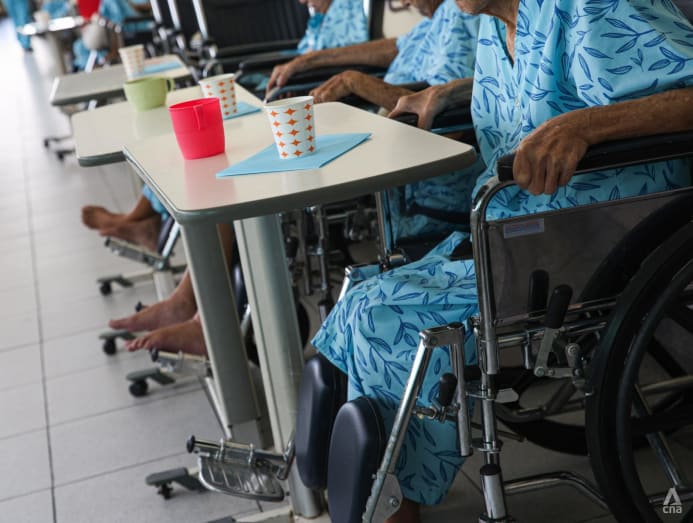 Seniors sit along a corridor during snack time at Sree Narayana Mission nursing home on February 7, 2025. (Photo: CNA/Nuria Ling)
Seniors sit along a corridor during snack time at Sree Narayana Mission nursing home on February 7, 2025. (Photo: CNA/Nuria Ling)
Ms Lourdes said the Sree Narayana Mission home aims to recreate a “neighbourhood-like” atmosphere by hosting communal gatherings such as a pasar malam (Malay term for night market).
The nursing home also taps on residents’ SkillsFuture accounts to help residents attend programmes such as gardening courses.
Head of Jamiyah Nursing Home and director of nursing Abdul Hadi Kamarolzama said residents go on outings to the nearby Ayer Rajah Food Centre and supermarket.
“At the end of the day, we all want to feel closer to our families. The whole process of ageing itself is really lonely, that’s why at our nursing home, we want to create the environment where they feel welcome, that we’re all a part of a family,” he added.
THE CONTACT TRACING TO FIND RESIDENTS' NEXT OF KIN
Where feasible, residential care facilities also try to help residents reconnect with any surviving next of kin.
Mr Michael Foo, director of Thye Hua Kwan Nursing Home said the home tries to reach to estranged family members to inquire about their potential interest in visiting the residents, wherever feasible and at the resident's expressed desire.
However, he noted that initial efforts to contact next of kin are typically conducted by the referring source, such as restructured hospitals.
Ms Tho from NTUC Health said that the group's nursing homes have on occasion been successful in locating distant or estranged relatives, who were able to visit the resident before their passing.
In one such case, a nurse aide helped to communicate with a visitor to inquire about potential family, leading to a reunion between a resident and his son.
Over at welfare home Banyan Home at Pelangi Village, a spokesperson said the home tries its best to contact family members if information is available.
The welfare home can accommodate up to 189 male residents, most of whom have been diagnosed with psychiatric illnesses. About 70 per cent of their residents, all of whom were admitted through MSF referrals, have no contact with their family.
“We have even tried to, as part of our routine outing activities, bring them to the neigbourhood of their listed address, hoping perhaps they might bump into some old neighbours or friends,” said the spokesperson.
However, the chances of reconnecting with family members are often slim, due to their many of their residents' prolonged hospitalisation in the IMH before admission to the home.
Ms Das from Ren Ci said the home’s medical social workers also carry out contract tracing efforts by reviewing personal records and reaching out to family members in situations where residents may be estranged from their next of kin.
For those who re-establish contact, the nursing home invites next of kin to attend family bonding activities, such as reminiscence outings to a resident's old haunts and a family portrait programme.
As part of the latter, volunteers and staff help residents dress up before capturing a family portrait on-site. Beyond the photoshoot, families are also guided through sessions to recall meaningful memories.
However, Ms Das noted that some residents may be content as is, even if they do not have contact with next of kin.
She said: “Residents who have no family or social connections may still be independent, of sound mind and happy with their current state. They are in a nursing home for care needs."
Collapse Expand
Despite the reliance on residential care to support Singapore’s ageing population, some nursing home and welfare home providers said there remains a gap in understanding what ageing in these settings truly means.
For one, there is the stereotype that residential care facilities are places where elderly persons are abandoned till their demise.
Dr Muhammad Farihin Mohd Azhari, assistant director of nursing at Jamiyah Nursing Home, said ending up in a nursing home can also be “embarrassing” for some, because of the expectation that one’s family should provide for them in their old age.
He said previous practices in nursing homes where residents were often left in highly restrictive environments with little engagement and mostly remained on bed rest have also contributed to a negative image of the care nursing homes can provide.
However, he noted that this stigma is slowly shifting as the standard of care and programme offerings at homes are being enhanced.
As mindsets shift, Mr Hadi from Jamiyah Nursing Home said more people may come to recognise that entering a nursing home is not just because one's family "does not want (them)", but that trained professionals in a residential setting may be able to offer a higher standard of care for those who need it.
Said Mr Hadi: “(A nursing home) is just a different roof. But their lives still go on. The friendships and sense of family still goes on.”
ENSURING DIGNITY IN FINAL DAYS
In the absence of a next of kin, residential care facilities often have to manage the affairs of residents in their final days, though honouring their wishes can be challenging.
"Sometimes residents were already unable to express their wishes by the time they are admitted, due to diminished mental capacity, so we would have to make the decisions on their behalf," said Ms Das, the head of psychosocial services at Ren Ci Hospital.
Nursing and welfare homes said they are reliant on government subsidies and donations to balance the books and support residents with limited financial means during their stay.
Thus, they work with funeral directors and charities to arrange for pro bono services after death.
Direct Funeral Services currently provides a quarterly sea burial ceremony serving around 20 to 30 unclaimed deceased persons.
“We felt a strong moral responsibility to give (these individuals) a final moment of honour, no matter their life’s story,” said Ms Jenny Tay, the firm's managing director.
 Direct Funeral Services staff conducting a sea burial for unclaimed deceased individuals in September 2024. The company conducts pro bono sea burials for around 20 to 30 individuals every quarter. (Photo: Direct Funeral Services)
Direct Funeral Services staff conducting a sea burial for unclaimed deceased individuals in September 2024. The company conducts pro bono sea burials for around 20 to 30 individuals every quarter. (Photo: Direct Funeral Services)
Mr Jeffrey Lee, sales and marketing manager at Singapore Casket, said that the company provides pro bono funeral services for about one resident without next of kin per month, and up to five cases monthly at peak demand.
Ashes are stored for three to six months in case a relative comes forward. He recalled one case where a family member, alerted by a government letter, found out about their estranged relative’s death and collected their ashes.
But rising demand for long-term care raises concerns about the reliance on donations and volunteers to support this group of elderly with no next of kin.
Non-profit organisation Cheng Hong Welfare Service Society, which provides pro bono funeral services for low-income seniors, has seen requests surge from about 12 cases a year in 2012 to 270 last year.
“A lot of people don’t understand that this is very taxing,” said its chairman Kenny Sim, adding that their volunteers handle everything from claiming the body to arranging cremation. Funeral arrangements can cost up to around S$3,000 per person, all of which is donor-funded.
On whether more data is needed to support this group, experts noted that publicly available statistics on seniors who die alone, whether at home or in a facility, are limited.
Nevertheless, the fact remains that nursing homes today are ever expanding. Mr Nicholas Netto, senior lecturer of social work at SUSS, said that the capacity of beds for nursing homes has increased from 9,400 in 2011 to about 16,300 as of end-2020.
Beyond the numbers, what is more important are the qualitative details, that seniors in nursing homes have positive lived experiences, said Dr Andy Ho from the Nanyang Technological University (NTU).
“Right now, the public perception and our innate attitude to dying alone is that it’s a horrible thing," said Dr Ho, who is provost's chair professor in psychology and professor of psychology and medicine at NTU.
"It can be (a horrible thing), but people also can choose and like that autonomy. Even if I don’t have a lot of family, it doesn’t mean I don’t have a strong support system,” added Dr Ho.
That is why with nursing homes as a core pillar of elderly care, there is a lot of work being done to ensure that these spaces offer a dignified home away from home, rather than just meeting the goal of providing enough bed capacity.
The point is that even if residents do not have any biological family, the ties they forge at these community homes make up for it.
At Ren Ci Hospital and Sree Narayana Mission's nursing home, for example, residents and staff members often mourn a resident’s passing through in-house memorial services or dedicated remembrance corners.
 A memorial corner set up at Sree Narayana Mission nursing home for residents who have recently died. (Photo: CNA/Nuria Ling)
A memorial corner set up at Sree Narayana Mission nursing home for residents who have recently died. (Photo: CNA/Nuria Ling)
Mr Quah from St John’s Home for Elderly Persons highlighted the case of Mr Loh PK, who became close with staff and volunteers during his stay, with one volunteer becoming his goddaughter.
When he died in December 2024, his cremation was facilitated by a pro bono funeral service.
“Staff (members) and volunteers from St. John's Home, who had known him well, attended the ceremony. The ceremony was brief but meaningful,” said Mr Quah.
Additional reporting by Taufiq Zalizan.
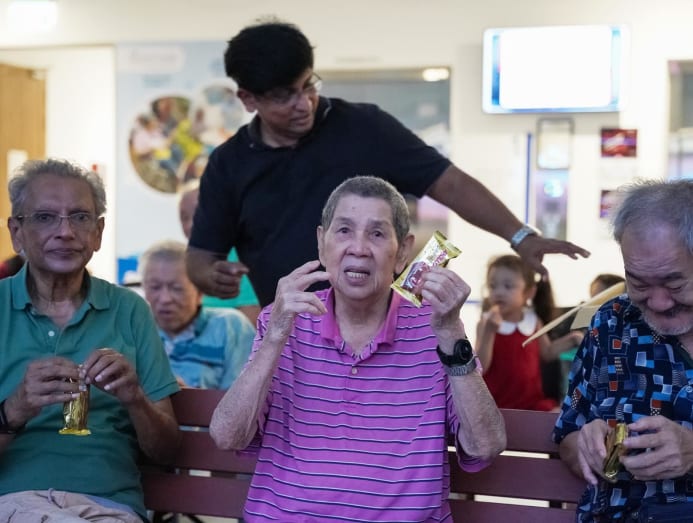 Mr Loh PK (centre), a former resident at St. John's Home for Elderly Persons in 2024. (Photo: St. John's Home for Elderly Persons)
Mr Loh PK (centre), a former resident at St. John's Home for Elderly Persons in 2024. (Photo: St. John's Home for Elderly Persons)


